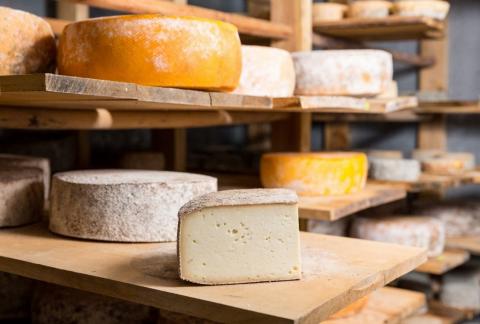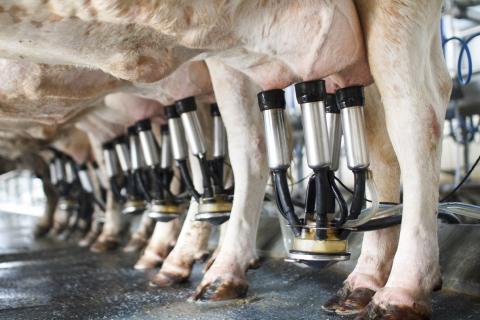10 August 2021
Dr Cate Williams: IBERS, Aberystwyth University.
- Around 80% of milk protein is comprised of casein, casein comes in many different forms, though the most variable and influential is κ-casein.
- The κ-casein gene also has many different alleles, each of which combines to produce milk with different properties, cows with BB alleles produce milk that clots faster and produces up to 10% more cheese than those with AA.
- Alleles are mostly separated by breed, with the majority of Holstein Friesians having the intermediate AB genotype that still offers some benefits in terms of cheese-making.
- A Farming Connect Focus Site project highlighted a potential interaction between stage in lactation and κ-casein genotype which affects cheese yield and composition.
Caseins are milk proteins secreted by the mammary gland which form approximately 80% of total protein found in bovine milk. Casein plays an integral role in cheese making as it dictates how well and how rapidly the milk clots and forms a curd. The family of casein proteins are made up of four different types, of which kappa (κ)- casein accounts for around 13%. Within the κ- casein group there are several different types which are dictated by the cow’s genetics: AA, AB, AC, BB, BC and AE. Casein molecules aggregate together to form “micelles” (an aggregation of molecules) of which, κ-casein plays a key role in structural stability. The main difference between these sub-types is how quickly and how well the milk coagulates – AA, BB and BC variants form smaller micelles (less than 200 nm) whilst those with AA, AC and AE have larger structures (200 nm and larger). The smaller the molecules, the closer they can bind which, in addition to the structural properties of κ-casein, leads to quicker coagulation times and firmer curd. Many breeds of cow have been genetically characterised for κ-casein genotype, although few studies have been carried out in the UK specifically. To make the most of these differences in κ-casein between cows, it is important to understand both influencing factors and the distribution of genotypes in the general population.
Effect on cheese yield and composition
The various different types of κ-casein occur thanks to point mutations in the κ-Casein gene. Because animals have two copies of each chromosome, that means they also have two alleles for any given trait – in this case for κ-casein. So, an animal can have any combination of these variants, here: AA, AB, AC, BB, BC and AE. If an animal is heterozygous for this gene it will have two different alleles like AB or BC, if it were homozygous it would possess two of the same, such as AA or BB. Animals with the BB genotype have consistently shown superior properties in cheese making in terms of shorter rennet coagulation time, a valuable attribute as the longer the milk is left to clot the greater the loss of raw material and the lower the overall yield of cheese. Milk from cows with a BB genotype had the quickest clotting time at 16.9-18.3 minutes compared to 30.4-31.3 mins for milk from animals with a AA genotype. Furthermore, some have found the cheese yield from cows homozygous for the B allele (genotype BB) is 10% higher compared to AA cows.
As well as production properties, studies have looked to quantify the effect of κ -casein genotype on milk and cheese composition. Some research has shown that for milk with BB or AB genotypes, κ-casein had a marked influence on cheese yield. BB variants produced the highest yields of cheese: AA milk produced 11.64%, AB milk yielded 13.3% and BB milk produced 13.8% - a difference of 2.2% between AA and BB genotypes. Cheese from BB milk also contained a higher level of fat (+11.9%) and protein (+15%) when compared to that from AA genotypes.
Distribution
Another important consideration is the distribution of genotypes – be that geographically or by breed. Table 1 shows the distribution of AA, AB and BB alleles in several common milk breeds. Aside from water buffalo, the breed with the highest occurrence of the BB genotype is the Guernsey breed, but across the board, the BB genotype remains in the minority, with AA being the most common overall. Interestingly, Guernsey and Jersey cows also produce “A2 milk” at a higher frequency than many other milk breeds – A1 and A2 are different types of β- casein, the latter reported to be highly digestible and suitable for those with cow’s milk protein allergy. Also of note is that the most common allele in Holstein-Friesian cows is AB which offers intermediate benefits, with yields and characteristics somewhere between the AA and BB phenotype. All water buffalo carry the BB genotype, which may contribute in part to its unique milk composition and suitability for producing mozzarella cheese.
Table 1: κ-Casein allele frequencies for different cattle breeds as assessed by the available literature.
Studies have also noted a geographic effect with separation between taurine (domestic European cattle) and indicine (Indian African Zebu) cattle. The A allele is more dominant in Western Europe whilst indicine African Indian breeds have a slightly higher occurrence of the B allele.
It is also of note, that a fourth allele has been described – the E allele occurs with a frequency of approximately 10% and is associated with milk that does not clot well and is therefore unsuitable for cheese making. As with the other two variants, the animal may be homozygous for this allele or heterozygous. The κ-casein allele occupies a highly variable position on the gene, and its likely that many more polymorphisms exist, although they may not be as significant in production as the A, B, C and E alleles.
Farming Connect Focus Farm, Clawdd Offa carried out a project to profile their own dairy herd and to identify any potential effects on cheese composition and yield. Of the 50 cows profiled, the most common allele was BB, followed by AB and AA. Despite lower protein and total solids, milk from BB cows clotted relatively quickly but did not result in consistently higher cheese yields overall. The study used a small sample size but highlights the potential effect of stage in lactation on total milk solids and subsequently cheese yield.
Summary
Studies have shown that the κ-casein gene is highly variable, with up to seven different alleles having been identified. This allele has a significant influence on the composition of milk that an animal produces which has a direct effect on cheese yields and qualities. Milk from cows with the BB genotype has been proven to coagulate quicker when compared to milk from AA or AB cows. Research suggests that the BB genotype may also contribute to higher cheese yields overall when compared to other alleles. Meanwhile, milk from cows with the E allele is known to be poorly suited to cheesemaking as homozygous (EE) milk truly does not clot whilst heterozygous clots poorly. The science behind the genetic polymorphism and milk composition are well explored and many breeds of cattle have been studied, whilst there is some geographic clustering of the allele, due to the genetic basis of the trait breed has a more significant influence on distribution. Further research into the interaction between κ-casein genotype and stage in lactation and the effect on cheese composition and yields would be beneficial.
If you would like a PDF version of the article, please contact heledd.george@menterabusnes.co.uk


